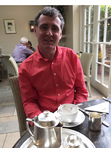Brave New World by Aldous Huxley- Strange Mixed Picture

Brave New World, published in 1932, is Aldous Huxley’s famous vision of a dark, future society, where, ironically, everyone is happy and fulfilled.
Let’s get one thing out of the way first. I don’t like Aldous Huxley’s writing style. He tends to stuff his paragraphs with redundant or repeated words. Look at how many times ‘the’ is repeated on the first page. And, from many possible examples, look at this passage, describing Brave New World residents visiting a ‘savage reservation’.
…their faces inhuman with daubing of scarlet, black and ochre, two Indians came running along the path. Their black hair was braided with fox fur and red flannel. Cloaks of turkey feathers fluttered from their shoulders; huge feather diadems exploded gaudily round their heads. With every step they took came the clink and rattle of their silver bracelets, their heavy necklaces of bone and turquoise beads. They came on without a word, running quietly in their deer skin moccasins’
Seven repetitions of ‘their’ in four sentences.
Right, I’ve got that off my chest.
So, after looking at how he says things, let’s turn to what Huxley is saying. Brave New World describes a society where government control has ended family life. Human reproduction is a factory process, engineering individuals with different intelligence levels to happily fit into a hierarchy of employment. Sex is a recreational activity. Society conditions people to enjoy easy-going, promiscuous relationships, whilst rarely feeling loneliness, or unhappiness. A drug called soma, a kind of alcohol, LSD amalgam, shorn of unpleasant side effects, acts to support eternal contentment in the present moment, without past regrets, or future hopes.
Some aspects of this society made sense to me as a possible scenario. Some did not. The bits that did not mainly concerned the idea of creating individuals with different abilities. Huxley seems to see ability as a very fixed quantity, which can be decanted in greater or lesser amounts into people. This didn’t seem true to life, in the present, or future. As just a brief nod to the real complexities involved, you could think of chaotic individuals with epsilon competence, enjoying alpha-plus confidence, who reach the heights of government. Sometimes it’s not how good you are, it’s how good you think you are that counts. Ability is too diffuse a thing to conveniently measure out.
However, other aspects of the Brave New World society did have a ring of truth. Control of relationships in the interests of authority was interesting, because this has happened historically. For example, there’s the idea of romantic love, which historians suggest was largely invented, or at least idealised, in medieval Europe, as a way for the Church to subdue family power. Family dynasties might want to make politic, arranged marriages in their long term interests. Romance, tends to set young love free, to make any choice it pleases. And young love is not well known for making sober assessments in the family interest. More recently in the UK we have seen a similar process in the use of inheritance tax, particularly after World War One. Aside from contributing a relatively small amount of money to the exchequer, inheritance tax acts to prevent families handing money down generations. This marked the real ending of aristocratic power in Britain, and the final consolidation of modern state government. So, it is true that authority has manipulated family relationships for political ends, and may continue to do so.
Also interesting is the Brave New World idea of happiness in not looking forward or back. There are, indeed, many modern health and spiritual movements – based around mindfulness or meditation for example – that emphasise living in the present moment. Alternative health, aside from its useful aspects, became a surprisingly problematic area during the pandemic, a breeding ground for covid conspiracies, which could extend to a denial that the illness existed. Carried to an extreme, you can imagine the rise of cold-hearted contentment in a drug-assisted present moment, past and future ignored, with people conditioned to believe that unhappiness and illness are not real.
Overall, Brave New World is a mixed bag, in some ways perceptive about human nature, in other ways not really seeming to understand people at all. And then there’s that writing style….



